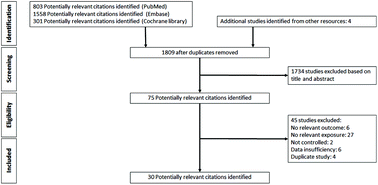Dietary linoleic acid intake and blood inflammatory markers: a systematic review and meta-analysis of randomized controlled trials (original) (raw)
* Corresponding authors
a State Key Laboratory of Food Science and Technology, Synergetic Innovation Center of Food Safety and Nutrition, School of Food Science and Technology, Jiangnan University, 1800 Lihu Road, Wuxi, Jiangsu 214122, P. R. China
E-mail: wangxg1002@gmail.com
Fax: +86 (0)510 85876799
Tel: +86 (0)510 85876799
Abstract
Purpose: The aim of the present study was to investigate the effect of increasing dietary linoleic acid (LA) intake on the blood concentrations of inflammatory markers including cytokines, acute phase reactants and adhesion molecules in adults. Methods: We comprehensively searched PubMed, Embase and Cochrane Library for eligible studies. Overall, 30 randomized controlled studies involving 1377 subjects were included for meta-analysis. Results: No significant effect of higher LA intake was observed for cytokines: tumor necrosis factor (SMD: −0.01; 95% CI: −0.19 to 0.17), interleukin-6 (SMD: 0.11, 95% CI: −0.07 to 0.29), adiponectin (SMD: 0.17, 95% CI: −0.17 to 0.50) and monocyte chemoattractant protein 1 (SMD: 0.14, 95% CI: −0.33 to 0.60). Pooled effect size from 16 studies showed that the C-reactive protein (CRP) concentration was not significantly affected by increasing LA intake (SMD = 0.09, 95% CI: −0.05 to 0.24). However, subgroup and meta-regression analysis suggested that in subjects with a more profound increase of dietary LA intake, LA might increase the blood CRP level. Other acute phase reactants including fibrinogen and plasminogen activator inhibitor-1 and adhesion molecules were not significantly changed when LA was increased in diet. No significant heterogeneity or publication bias was observed, although only a limited number of eligible studies were included for some markers. Conclusion: Our meta-analysis suggested that increasing dietary LA intake does not have a significant effect on the blood concentrations of inflammatory markers. However, the extent of change in dietary LA intake might affect the effect of LA supplementation on CRP.

You have access to this article
 Please wait while we load your content... Something went wrong. Try again?
Please wait while we load your content... Something went wrong. Try again?
Supplementary files
Article information
DOI
https://doi.org/10.1039/C7FO00433H
Article type
Paper
Submitted
20 Mar 2017
Accepted
04 Jul 2017
First published
28 Jul 2017
Download Citation
Food Funct., 2017,8, 3091-3103
Permissions
Dietary linoleic acid intake and blood inflammatory markers: a systematic review and meta-analysis of randomized controlled trials
H. Su, R. Liu, M. Chang, J. Huang and X. Wang,Food Funct., 2017, 8, 3091DOI: 10.1039/C7FO00433H
To request permission to reproduce material from this article, please go to the Copyright Clearance Center request page.
If you are an author contributing to an RSC publication, you do not need to request permission provided correct acknowledgement is given.
If you are the author of this article, you do not need to request permission to reproduce figures and diagrams provided correct acknowledgement is given. If you want to reproduce the whole article in a third-party publication (excluding your thesis/dissertation for which permission is not required) please go to the Copyright Clearance Center request page.
Read more about how to correctly acknowledge RSC content.